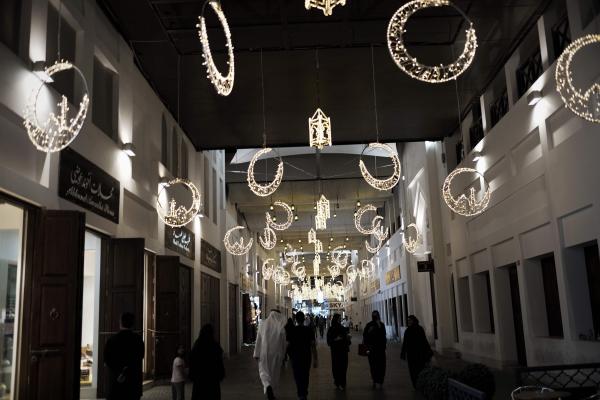Every season or month of the year has a smell associated with it that lingers in our memories. Many people have a specific smell that they associate with Ramadan. There are those who remember the smell of lentil soup or grilled kebabs. Personally, I associate the smell of pomegranate with Ramadan. My mother thought that pomegranate juice made thirst go away and so she took great pains to prepare some for our pre-fast meal.
Once we had opened our fasts we would gather around the table laden with pomegranates.My brother Muayyad would be given the knife and would start cutting and my other brother Muzaffar would wash his hands thoroughly so that he could extract the seeds from the pomegranate quarters. Muwaffaq would come along and roll his sleeves up to begin the painstaking process of juicing. My mother would collect all the juice and then leave it to cool in the fridge, ready for the pre-fast meal.
During the whole process, the entire house would be contaminated with pomegranate peel, seeds and juice. Wherever you walked you would discover pomegranate peel and seeds under your feet. The courtyard would smell of pomegranates until the following day.
“Drink, boys. You, Khaled, drink! Drink! You’re weak. You need the pomegranates”. My mother used to worry about my slender frame and the pallor of my face and thought that pomegranate was a good source of iron. We would hasten to drink the pomegranate juice before the Ramadan cannon resounded, signalling the beginning of the fast. Pomegranate juice would drip on our faces, chests and garments and we would thank God for His blessings and grace. We would thank our Lord who gave the sons of Adam that mighty blessing – the pomegranate tree.
Ramadan, like all religious seasons, is characterised by a family atmosphere, family gatherings where the young and old sit around a dining table eating the pre and post- fast meals and exotic food. Like other families, we too would gather around the table after breaking our fasts. However, in our house, there was another occasion for which we gathered; our appointment with pomegranates and its juice.
Gone are those days and nights, and Baghdad has disappeared from the horizon of my life. However, whenever I see pomegranates in the shops in London, I hasten to purchase a quantity of them knowing full well that Spanish pomegranates, which are sold in London supermarkets, are very different to Mandali pomegranates that we got used to; each the size of a watermelon. When I hold a Spanish pomegranate in my hand, it reminds me of Iraq’s pomegranates and the days during which we juiced them. In the same way, the days of Ramadan remind me of the smell of pomegranate seeds, peel and juice. The two go hand in hand in my spirit and psyche.
During the blessed days of Ramadan that have gone by, it occurred to me to ask our brothers and sisters in London what they remember from their childhood days during Ramadan. I have told them about our rituals at home, the story of pomegranates and my mother’s belief that they were good for combating thirst.
Umm Fadal looked at me in astonishment and said “Pomegranate? Pomegranate, my dear man, causes thirst! Where did your mother, may God have mercy on her soul, get this idea from? Everyone in Iraq knows that pomegranates make a person thirsty! We used to rely on dried apricots at home. This is what really kills thirst!”
My poor mother, may God have mercy on her soul! She was always thirsty. Now I know why!
